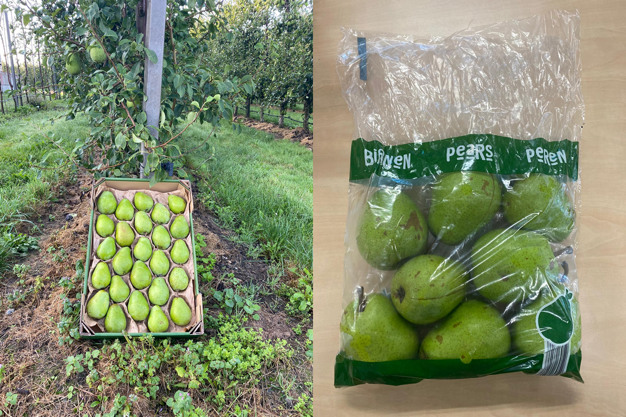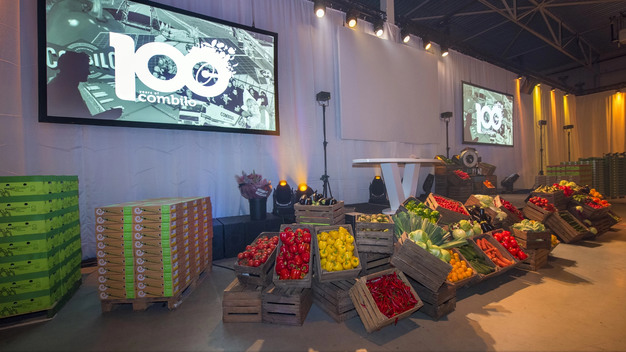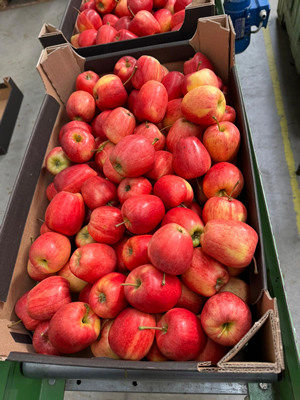With the harvest complete in most areas and the first weeks of sales behind us, it's time to take stock. Randy Dijksman from Combilo shares his outlook on the top fruit season.

"Hail damage has been a widely discussed and unavoidable topic this sales season. A lot of time has been spent adjusting specifications and managing expectations regarding the (skin) quality of the fruit. Almost all growing regions have been affected, so retailers are relatively accepting. However, we must all acknowledge that we are presenting consumers with a product of lower quality. Unfortunately, there's no room for explanation on the store shelves, and this will be left open to interpretation. It remains unclear how this will play out, especially in combination with the enthusiastic pricing from the very start," says Randy.
"In my opinion, we also shouldn't overlook the overall quality of the fruit. During the growing season, we faced challenging weather conditions. Fortunately, thanks to the knowledge and expertise of the growers and the resilience of nature, we were still able to harvest a reasonably good volume. However, I expect we will need to keep a close eye on the storage quality of the fruit. We've heard reports of some fruit that will need to be sold sooner than expected."

Exceptionally large pears in some growing regions
Combilo is primarily involved in marketing pears to European retailers. "This season, we are facing the unusual situation where pears from growing areas with lighter crop loads have become exceptionally large. This has disrupted a balance we've relied on for many years. Normally, at the beginning of the season, we market a lot of smaller pears from Belgium. However, this year, the pears are much larger, limiting our options. The same is true in the Netherlands, where the pears are also bigger, and there is traditionally less willingness to sell early. As a result, the large discount promotions that usually kick off the season have not materialized," says Randy.
"On the positive side, Spain entered the market earlier this year and has shown immediate interest in Conference pears. At the same time, we're not seeing the strong demand from Italy that we experienced last season. Italy has a decent volume of pears available domestically and will first clear that stock before turning to us on a larger scale. The situation is similar in Eastern Europe, where local harvests are prioritized, partly because our pears are priced higher from the start, and there's uncertainty about their storability."

Monitor sales pace
"In summary, we are experiencing a cautious start to the season. The markets that traditionally take the larger pears are still only moderately active, while the markets that typically prefer smaller pears can hardly be served. As a result, we are currently in a very calm phase and will have to wait for things to pick up," Randy continues. "In my opinion, we do need to keep an eye on the sales pace. While we do have a much smaller pear harvest, at the current rate, we will quickly reach a 'normal' stock level."
"When we look at the smaller varieties, like BA Lucas, the situation is similar. The fruit has generally become very large, and the sales opportunities for it are still limited. However, for Doyenné du Comice, this works in our favor. The smaller harvest, combined with excellent sizing for this variety, has led to a smooth sales process, with large orders already taking significant positions. The season for Doyenné is essentially already determined," says Randy.
Re-export of Polish apples Combilo is not active in the Dutch and Belgian apple markets. "I've heard that the challenges are no less significant, with hail damage causing more losses in apples. The larger fruit sizes are also forcing the search for creative solutions. For several years now, we have been actively involved in the large-scale re-export of Polish apples. Here too, we've seen that orchard conditions have been far from ideal. About a quarter of the growing areas were hit by frost, resulting in a very small harvest there. Other regions are showing better yields, but they've faced highly fluctuating temperatures. During the harvest of varieties like Royal Gala, for example, it was very warm. This has led to significant differences in the firmness of the apples, and their storability is not always guaranteed. However, the fruit looks very appealing, with good presentation."
Combilo is not active in the Dutch and Belgian apple markets. "I've heard that the challenges are no less significant, with hail damage causing more losses in apples. The larger fruit sizes are also forcing the search for creative solutions. For several years now, we have been actively involved in the large-scale re-export of Polish apples. Here too, we've seen that orchard conditions have been far from ideal. About a quarter of the growing areas were hit by frost, resulting in a very small harvest there. Other regions are showing better yields, but they've faced highly fluctuating temperatures. During the harvest of varieties like Royal Gala, for example, it was very warm. This has led to significant differences in the firmness of the apples, and their storability is not always guaranteed. However, the fruit looks very appealing, with good presentation."
"This season is testing us all. The playbooks from previous seasons can be thrown out, and at times, we'll be forced to come up with creative solutions. The saying 'selling is also an art' definitely applies this season. If the entire supply chain is willing to remain resilient, I'm confident we'll have a successful and healthy sales season. However, we'll need to use our heads and stay focused. We've seen before that when too many players start speculating, it can lead to significant problems," Randy concludes.
 For more information:
For more information:
Randy Dijksman
Combilo
Transportweg 23
2742 RH Waddinxveen
Tel: +31 (0)180 446 747
[email protected]
www.combilo.nl
